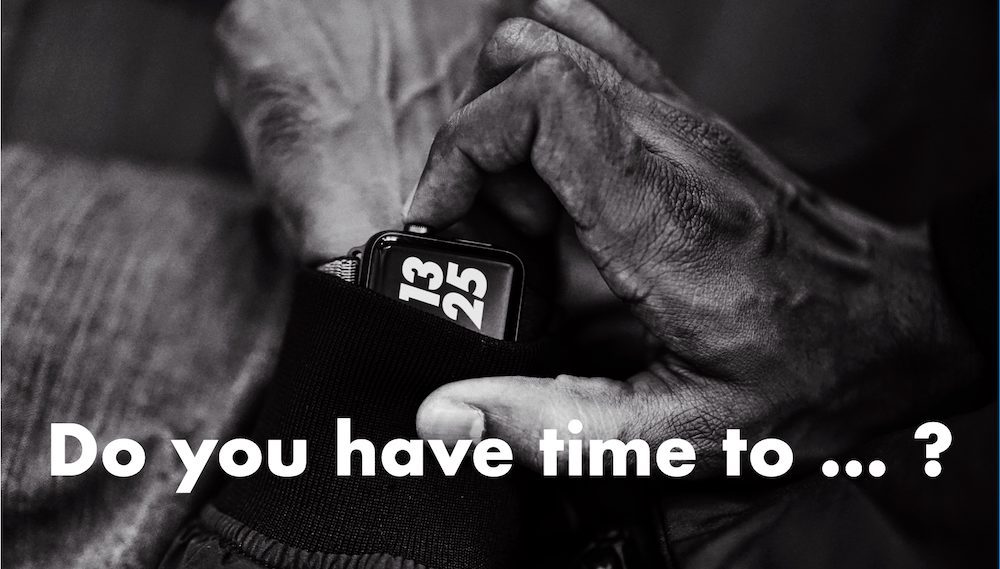Are you an on-time kind of person or one who is typically running late? I certainly strive to be the former, albeit not with 100% success. No one’s perfect, but whenever I hear someone start a sentence with “Sorry for being (or replying) late” or “I didn’t have time to…” I tend to get irritated. First off, it’s a choice you made, so I hope you are accountable for how you choose to spend your time. Secondly, please don’t be sorry and regret how you spend your time. It’s the most valuable resource any of us. We all only have 24 hours in a day and it’s up to us how we use it. Rather than be sorry for how we spend our time, I exhort taking responsibility for how we manage it.
Own your time

Not that I haven’t ever heard myself say to someone else that “I didn’t have the time…”. Sure, it can slip out. But I typically auto-rebuke myself immediately. There are generally two postures you can have about time.
- You can choose to be the victim of the 24-hour daily limit, or
- You can own your time and be accountable for how you spend your time.
Being on top of your time takes effort. There are certainly days for even the most organized of people when one’s schedule is overrun by external events. Yet, it’s really about having the right mindset. You need to own your time, be responsible for showing up on time and for allowing yourself the time to do what you need and deep-down want to do.
Do you have time to … ? You need to own your time, be responsible for showing up on time and for allowing yourself the time to do what you need and deep-down want to do. By @mdial Share on XTime to think?
If there’s one thing that the pandemic lockdowns did for many (but certainly not for all) was that it gave us more time … It gave us more time than before to the extent we no longer had to commute or even had the option to go out and have fun. We were cloistered in our homes, with more time to sleep in, hang out by ourselves or with our household members, and… to think. As such, for many, this pandemic created a series of new waves, thoughts and experiences. It was not the same reality for everyone, I reiterate. Some people were stuck in desperately unhealthy situations, shacked up with hard-to-handle kids or partners in less than suitable arrangements for home work. There were those who had to work much more than usual, for example for those dealing with the sanitary crisis or, in business, those involved in eCommerce. But for many, it was an occasion that, albeit shaken up, provided a pause from the usual rat race.
A time to be…

During the pandemic (and it’s certainly not over), it seems that not only have the times changed, but the notion of time itself has changed. We have thought about and experienced time in very different ways. There are two fundamental characteristics to how, when time changes, we change. The first is we’ve had a lot more time to be, and not just to do. It’s provided time to ponder our existence. Who am I? What and who’s important for me? For certain, especially living in unfortunate circumstances, this was a tough and troubling journey. For example, I heard of many being furloughed or unemployed for the first time in their lives and having to reconfigure how to exist without a structured environment and/or list of things to do. For others, along with the constant negative news cycle, it’s brought along mental health issues and/or had devastating consequences to business. For companies looking to reboot their business post pandemic and bring their employees back to a “normal” work environment, there will surely be many people questioning their engagement at work. Many employees will be asking: What genuinely motivates me? Why should I bother? What does my company do that truly matters?
Time is limited

The second consideration — as time virtually stood still during these lockdowns and media harped on about Covid cases and deaths — is that we have been faced with our own mortality. Inevitably, we all feel somehow closer to death. And the operative word is closer. Just as in the philosophy behind mindfulness where there is an inherent quest to come to terms — and be at peace — with one’s own death, now having had the time to think about it, we have been shown over and over that our time on this Earth is genuinely limited. As fans of the Grateful Dead philosophy will attest, once you embrace your own finitude, you will more readily embrace and enjoy the present. We have the opportunity to seek inner peace and be grateful for what we have. And, importantly, in the work we do, to make sure that we are doing something meaningful.
Time to take responsibility
As such, it becomes our responsibility, for each and everyone of us, to make a choice. Going forward, are we going to get dragged down with our fears and unhappiness, or embrace our finality on a course toward deeper fulfilment and wonderment? Far from preaching an idyll, my ambition is to dig my heels in to recognize the privilege, conditions and freedoms we inherited from those fought for them in the past. I certainly take inspiration from those veterans I interviewed for my WWII documentary film, The Last Ring Home. We must be vigilant to protect our hard-fought liberties and be grateful for what we have and who we are. With that most limited resource that is our time, we have a choice to be more, to work with conscience and have a wholesome ambition.
To what extent will you make the time to do what matters? To read about topics that count? To stand up for what’s important? To allocate more of your day to being the best version of yourself?
***If you like my writing and are interested in fostering more meaningful conversations in our society, please check out my Dialogos Substack. This newsletter will feature articles on why and how we can all improve our conversations, whether it’s at home, with friends, in society at large or at work. Subscription is free, but if you see value in it, you are welcome to contribute both materially and through your comments. Sign up here:











